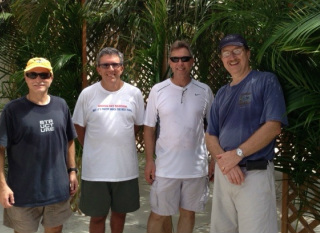 The Temple Beit HaYam sukkah and its marvelous builders
The Temple Beit HaYam sukkah and its marvelous builders This is an odd holiday. We build a small, flimsy structure and — for one week — get comfy in it. We put up our feet, relax with a nice meal, and call it "home sweet home."
If we should happen to notice that nice solid looking building next to the sukkah — the one where we keep our bed, furnishings and books — we think to ourselves, "Yes, that is my temporary shelter. It's sort of an out-building. A shed. I acquired it almost by accident. This lovely hut with the roof made of branches — this is my real house. This is where I live."
Is this a holiday for us to lose touch with reality? In a way, yes.
Sukkot is about changing your perspective and looking at things in a completely different way from the usual. It is about intentional disorientation. For seven days, we convince ourselves that everything we thought we knew is wrong. Up is really down; right is left; in is out; and, most importantly, permanent is really temporary, and vice versa.
We engage in this odd behavior because we need to. We need to remember that the things in our lives that we are most prone to regard as solidly, permanently real — our homes, our possessions, our identity, even our our physical existence — are really quite temporary. In truth, the things that are most real in life are the things that we usually think of as fleeting and ephemeral — convictions, ideals, values, faith, friendship and love. Sukkot invites us into a topsy-turvy world in which huts with loose branches for a roof are permanent, and steel-framed buildings with poured concrete are temporary. It does this so we can see what is really real.
In fact, almost every holiday and ritual has some aspect of intentional disorientation. On Shabbat we live in a time beyond time where work is unnecessary. On Passover we affirm that we personally were slaves who left Egypt. On Shavuot we hear and see the voice of God from Mount Sinai. On Yom Kippur we live as if food and drink were unnecessary for our existence. On Purim we enter a state in which there is no difference between "blessed is Mordechai" and "cursed is Haman." We choose to depart from our ordinary reality in order to glimpse the deeper truths that underly our world.
In my mind, the intentional disorientation of Sukkot stands above them all. There is something so very physically real about a sukkah. It is our most elaborate and massive ritual object. When you are sitting inside a sukkah, you truly can convince yourself, "Yes, this is the way things should be. I could sit in here forever and be happy."
Why should it not be so? This week, may it be your reality.
Moadim l'simcha, chagim uzmanim lesason!
May these days bring you joy. May these festivals and seasons bring happiness to you!
Other Posts on This Topic:
Sukkot: Reconnecting to Our Food
Sukkot: Building Something from Nothing

 RSS Feed
RSS Feed
